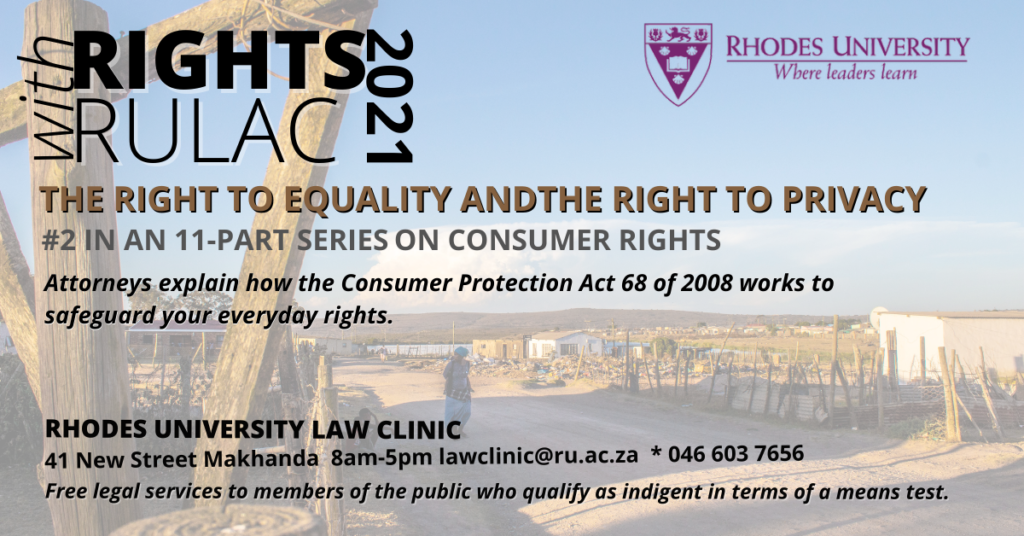By SHAUN BERGOVER
Following the introduction to the Consumer Protection Act (CPA) in last month’s edition, in this article we will be looking at some rights consumers are afforded by the Act. We will specifically be covering the rights to equality and privacy. In our monthly articles throughout this year we will be addressing many other consumer rights.
Protection against discriminatory marketing
Section 8(1) of the CPA deals with a supplier’s duty to treat people fairly, and not to discriminate against consumers unfairly. A supplier in this context is a person who markets any goods or services to the community. This section relates to section 9 of the Constitution and the Promotion of Equality and Prevention of Unfair Discrimination Act, which list grounds upon which a person cannot be unfairly discriminated against. Some of these listed grounds are race, gender, sex, age, disability and religion.
Examples of unfair discrimination are:
- Where a supplier either gives you special treatment, or refuses to give you access or to assist you, because you are black, white, coloured, Indian, male, female, belong to a certain political party, a certain class or some other ground listed in section 9 of the Constitution;
- Where a supplier refuses to let you examine goods that you have bought for the reasons set out above;
- Where a supplier supplies a different quality of goods to you because you fall into one of the categories listed above; or
- Where a supplier charges you a different price because you fall into one of the categories listed above.
It is important to understand that there are times when people must be treated differently. This is still discrimination, but it is fair discrimination. Section 9 of the CPA allows for differential treatment in the following cases:
- Where a supplier refuses to supply goods or services to unassisted minors who need their parents’/guardian’s permission;
- Where special treatment is given to very young people (use of a playground) or adults over the age of 60 (pensioner discounts);
- Where a supplier has separate and/or special facilities for people of different genders or ages (separate bathrooms in a restaurant); or
- Where a supplier markets certain goods for a specific part of the population with good reason (facilities specifically for disabled people).
If you feel like your rights as a consumer have been violated, you can approach the Equality Court for assistance, or you can lodge a complaint with the National Consumer Commission. According to the CPA, any differential treatment experienced by consumers is unfair discrimination, unless the supplier can prove that it was fair.
The right to privacy
The right to privacy (the right “to be left alone”) is entrenched in section 14 of the Constitution. Section 11 of the CPA says that you have the right to refuse direct marketing approaches, and offers to sell you products or services (eg insurance). Nowadays, this mostly happens through uninvited phone calls, smses or emails. If you have been contacted telephonically, for example, you have the right to block any further approach or communication from that person if the approach or communication is primarily for the purpose of direct marketing. You also have the right to insist that the person approaching you stop communicating with you, and to remove your contact details from their list.
The only exception to the above is if the consumer has expressly or implicitly requested or agreed otherwise – for example, if you request the marketer to call you back at a certain time.
Prohibited Contact Times
In order to protect the privacy of consumers, the Minister may prescribe specific days, dates, public holidays or times of days when suppliers can contact consumers. In terms of the regulations to the CPA, no supplier may contact a consumer during the following times:
- Sundays or public holidays;
- Saturdays before 09h00 and after 13h00;
- All other days between the hours of 20h00 and 08h00 the following day.
The consumer’s right to privacy will be strengthened even further when most of the Protection of Personal Information Act comes into force in July this year.
- Shaun Bergover is an Attorney at the Rhodes University Law Clinic. This article is #2 in a 2021 series on consumer rights in terms of the Consumer Protection Act 68 of 2008.
Rhodes University Law Clinic helping you
The Rhodes University Law Clinic strives to improve access to justice through the provision of free legal services to indigent people in most areas of law. The Law Clinic’s New Street offices are open during ordinary business hours, and their services are available to those members of the public who qualify for assistance in terms of a means test. For more detail, please contact:
Rhodes University Law Clinic
41 New Street, Grahamstown
Telephone 046 603 7656
lawclinic@ru.ac.za
https://www.grocotts.co.za/2021/02/09/as-a-consumer-do-you-have-rights/
Know your rights as a consumer
This 11-part 2021 series is written by attorneys at the Rhodes Law Clinic. The articles cover various aspects of consumer rights in terms of the Consumer Protection Act 68 of 2008. Here are the articles published to date:
#1 As a consumer, do you have rights?
#2 The right to equality and the right to privacy


